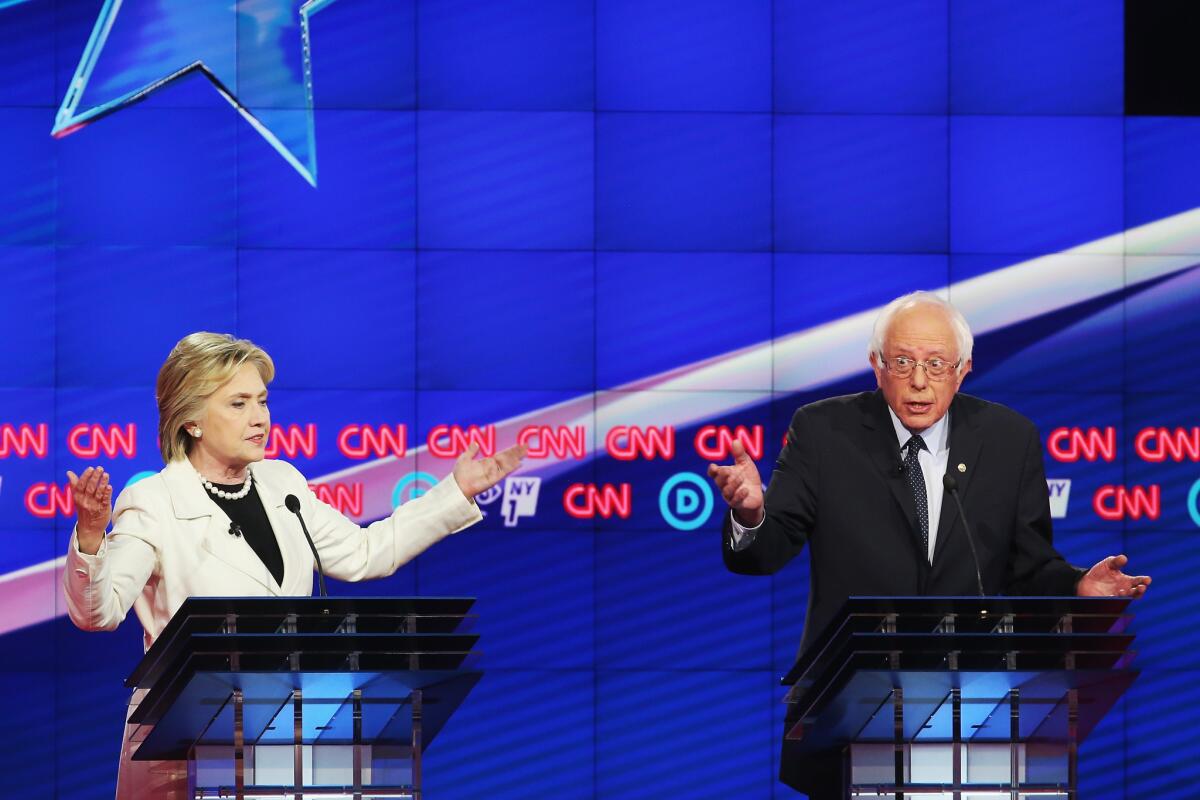Opinion: Hillary Clinton flunks the yes-no question test

Democratic presidential candidates Hillary Clinton and Bernie Sanders at the CNN debate April 14 in New York.
- Share via
Primaries require candidates to play to their party’s base, and it’s easier to do so when your campaign depicts the world in black and white -- evil vs. good, wrong vs. right. The choices that elected officials actually have to make, however, aren’t binary, so politicians who hold themselves out as realists have to sell the public on something more nuanced. Squishier.
At the Democratic debate Thursday in Brooklyn, crusading Democratic socialist Bernie Sanders showed viewers just how squishy Hillary Clinton could be.
He did so by pushing Clinton to give yes-no answers to questions about raising the federal minimum wage to $15 an hour and shoring up the Social Security Trust Fund. And rather than sounding peevish by saying those topics defy simplistic approaches, Clinton tried to have it both ways, only to have Sanders call her on it.
She insisted that she was an early supporter of the “fight for $15” in cities across the country, then had to admit that she backs a more modest proposal in Congress. And when asked if she would increase Social Security taxes on middle- and upper-income earners, she said she was in “vigorous agreement” with Sanders -- after saying the government should be looking at other ways to achieve the same goal.
The maddening thing is, Clinton shouldn’t be afraid to be less rigid than Sanders. Her position on the minimum wage, for example, aims lower but is a lot more reasonable. Sanders’ stated goal is to push the entire country to a $15 wage, more than twice the current federal minimum, as soon as possible. Clinton, by contrast, backs a bill by Sen. Patty Murray (D-Wash.) -- no one’s idea of a centrist Democrat -- to raise the federal wage to $12 while urging states and cities to go higher if they can.
Anyone who cares about eliminating poverty knows how important it is to raise the incomes of low-wage workers. The question here, though, is whether that can be done with the wave of a wand, or whether it requires a much broader effort to increase job skills, eliminate barriers to full-time work and fire up the economy to intensify the competition for labor. There’s also the risk that sharply raising the price of labor will make it harder for younger and less educated people to find work at all. Yet that risk is balanced against the prospect that a higher minimum wage will lead to more spending, higher demand and greater economic growth.
Could Clinton have held the audience’s attention long enough to explain these trade-offs and complexities, triggering a more useful discussion of anti-poverty programs? Probably not. Yet she didn’t even try.
There’s no reward in politics, it seems, for trying to explain how complex things are.
She didn’t fare much better on the Social Security question, which dealt with the cap on payroll taxes. Today, the Social Security portion of the payroll tax is collected on the first $118,500 in income only; that cap also limits the maximum benefits paid. Moderator Wolf Blitzer asked whether Clinton was “prepared to lift the cap on taxable earnings ... yes or no.”
But that’s not what Sanders has advocated, because simply lifting the cap on taxes and benefits would raise taxes on a lot of middle-class households in high-cost areas. And while it would improve Social Security’s solvency well into the future, it would not be a permanent solution because the program would still run into the red eventually.
What Sanders has proposed is to remove the tax cap on those making more than $250,000 a year, while leaving the benefits cap in place -- an idea, he says, that Barack Obama championed in his 2008 campaign. Several analysts have projected that this change would close Social Security’s funding gap for at least 75 years. But Sanders didn’t acknowledge how the move would transform Social Security from an insurance program into a welfare program, transferring wealth explicitly from higher incomes to lower ones.
In Sanders’ view, that’s a feature, not a bug. But it’s fraught politically. One reason Social Security has withstood attack after attack over the years is the public’s sense that it’s a savings program -- what you receive in benefits is based on what you pay in. That sense would evaporate if benefits were capped but taxes were not.
Again, it may be the right policy, but the change isn’t nearly as simple as Sanders suggests. And to her credit, Clinton pointed out other changes that could be made to shore up the Social Security Trust Fund without reducing benefits or turning the retirement program into something that looks like welfare. But instead of insisting on a more sophisticated debate, Clinton pretended she was on the same page as Sanders. She isn’t, and she ought to own that.
Then again, the Republican presidential primaries once had several candidates who tried to point out the complexities of real-world governing, including Sen. Lindsey Graham (R-S.C.) and former Florida Gov. Jeb Bush. The only one left now is Ohio Gov. John Kasich, whose “I’m the adult in the room” campaign theme has left him far, far behind front-runner Donald Trump.
There’s no reward in politics, it seems, for trying to explain how complex things are. Still, if you’re going to offer policy prescriptions that acknowledge real-world tradeoffs, you need a better answer to yes-no questions than Clinton offered Thursday night.
Follow Healey’s intermittent Twitter feed: @jcahealey
A cure for the common opinion
Get thought-provoking perspectives with our weekly newsletter.
You may occasionally receive promotional content from the Los Angeles Times.







